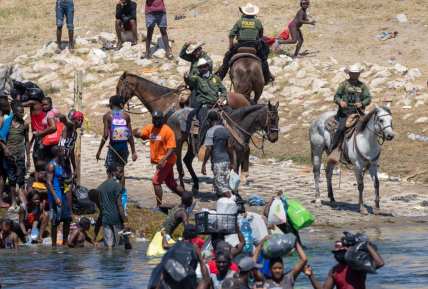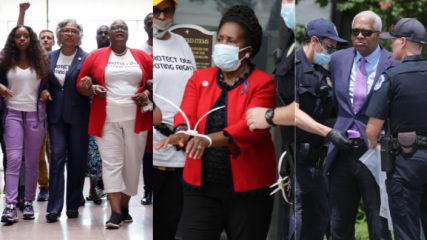The Black agenda is front and center at Biden White House — but will there be results?
EXCLUSIVE: On a handwritten card President Biden carried in his pocket at the White House, Haiti, policing and votings rights are at the top of his list.
President Joe Biden carries around a white card on the inside of his jacket pocket with a list of important issues for the day. On Wednesday, the left hand side of that card, which is said to be written in his handwriting, were three topics focused on the Black agenda: policing, voting rights and Haiti.

These issues are said to be top of mind for President Biden, who is also weighed down by a hoped-for passage of infrastructure legislation and a looming government shutdown if a crucial funding bill is not passed by Congress.
Since the circulation of the graphic border patrol photos of officers mistreating Haitian migrants, Daniel Foote, the US special envoy to Haiti, resigned and said in a statement he would “not be associated with the United States’ inhumane, counterproductive decision to deport thousands of Haitian refugees.”
Since the first briefing of the week on Monday, the Biden administration’s Black agenda has been front and center at the White House daily briefing. By midweek, one of the issues on that agenda, policing, came to a crashing halt as bipartisan police reform negotiations between Republican Senator Tim Scott, Democratic Senator Cory Booker and Congresswoman Karen Bass came to an end.
Senator Scott, the Republican Party’s only Black senator, acknowledged that Republicans and Democrats were too far apart on the matter.
“Potential executive order actions” could be part of the solution on the persistent police reform issue. The White House plan in the coming weeks is to engage all communities and stakeholders in the policing issue to see what can be done to make police reform a reality.
“We shouldn’t have to feel like second-class citizens here in this country. We’re here just like everybody else. We think we should have equality,” Philonise Floyd, the brother of George Floyd, tells theGrio. George Floyd is the namesake of the police reform bill — the George Floyd Justice in Policing Act — Democrats have been pushing to pass in Congress.

Equality and scrutiny of whether it is being championed and applied to policing, as well as immigration policy has been the focal point of the White House’s press briefings throughout the week.
The issues of a dire migration situation on the United States-Mexico border dominated the briefings with Biden Press Secretary Jen Psaki. But Biden’s Black agenda took a greater hit after Sen. Booker in a statement announced the ending of police reform talks with Sen. Scott, his Republican negotiation partner.
Meanwhile on the issue of Black immigration, there is an expectation for the Department of Homeland Security investigation into the inhumane treatment of Haitian migrants at the hand of border patrol agents to yield “an outcome by next week,” Psaki said at the White House press briefing room podium. She condemned the actions of the agents using the long reins that are typically meant for horses but were instead used on people. The White House spokesperson said the investigation “will be a determinant in any policy and personnel decisions moving forward.”
U.S. Congressman Al Green of Texas tells theGrio there are certain procedures that must happen in the probe of border patrol’s actions. “I just don’t think that they should keep their jobs,” says Green. “To see that kind of behavior is something that you don’t tolerate.”
At the southern border, Psaki updated the press on the status of the immigration patrol agents on horseback who used horse reigns as whips to lash and push back Haitians trying to cross the border. The agents are all on administrative duty since those videos and images were released publicly and sparked an international debate on the inhumane treatment of migrants.

Psaki signaled that President Biden will play a role in “next steps” on immigration and this crisis.
theGrio reported on the harsh realities Black immigrants faced as they pursued opportunities to resettle in the United States. While Haiti is the focus right now, at the White House briefing on Wednesday, Psaki acknowledged Haitians are not the only people who have migrated through South America to the border.
Africans at the border from Uganda, the Congo and Cameroon are also experiencing harsh treatment at ICE facilities with higher bonds.
In 2019, the Congressional Black Caucus led a delegation to the border to meet with African immigrants on this issue. During that border crisis the CBC worked to tell what they called the “untold story at the border.”
The CBC said during those Trump administration years, Africans came to U.S. borders as European nations closed their borders to them. Fast forward to today, that story of the atrocities often facing those of darker hue seeking asylum and new life in the United States of America are being revealed on the national stage.
On Thursday, U.S. Congressman Hakeem Jeffries, who is also chair of the House Democratic Caucus, tweeted about another ongoing issue on Biden’s Black agenda: voting rights.
“Now would be a good time for the Senate to pass the John R. Lewis Voting Rights Advancement Act. (With or without Republican support),” Congressman Jeffries wrote.
Members of Congress, civil rights leaders and activists have been hitting the streets in protest of anti-voting laws being proposed and passed by Republican-controlled state legislatures on the heels of former president Donald Trump’s big lie that the 2020 presidential election was a result of voter fraud.
The wave of bills limiting access to the ballot — disproportionately impacting Black and Brown voters — has ignited calls for the Democratic-controlled Congress to pass the John Lewis Voting Rights Advancement Act, which would restore protections in the Voting Rights Act of 1965. The Senate filibuster, however, stands in the way as Republicans in the minority have the legislative tool as an option to kill any such bill on the Senate floor. So far, moderate Democrats like Sen. Joe Manchin and Sen. Kyrsten Sinema have signaled they are unwilling to vote with their majority Democratic caucus to eliminate or modify the filibuster in order to achieve the party’s critical policy goals.
Just last month, thousands assembled in the nation’s capital on the 58th anniversary of the March on Washington in protest of anti-voting laws passed in Texas and Florida, and proposed in dozens of states. Numerous demonstrations in Washington have led to the arrests of members of Congress, including Reps. Sheila Jackson Lee, Hank Johnson, Al Green, Joyce Beatty and civil rights giant Rev. Jesse Jackson.
Have you subscribed to theGrio’s “Dear Culture” podcast? Download our newest episodes now!
TheGrio is now on Apple TV, Amazon Fire and Roku. Download theGrio.com today!
More About:Politics












